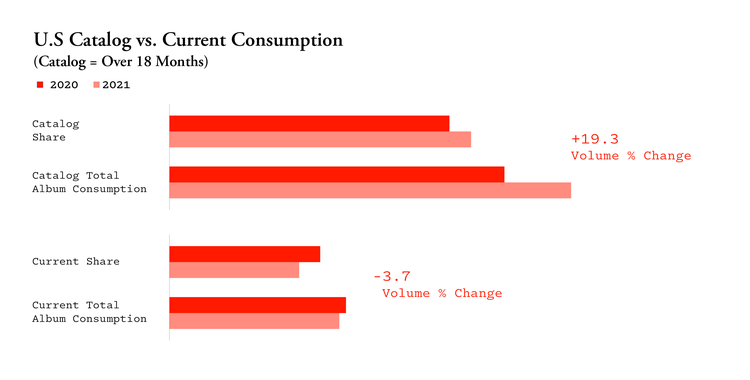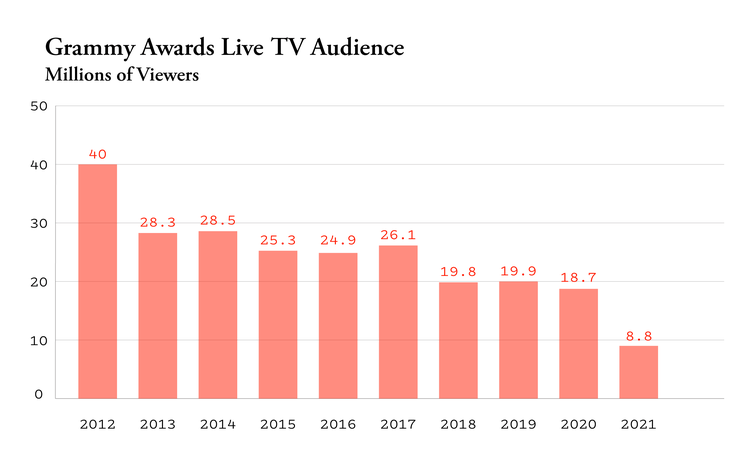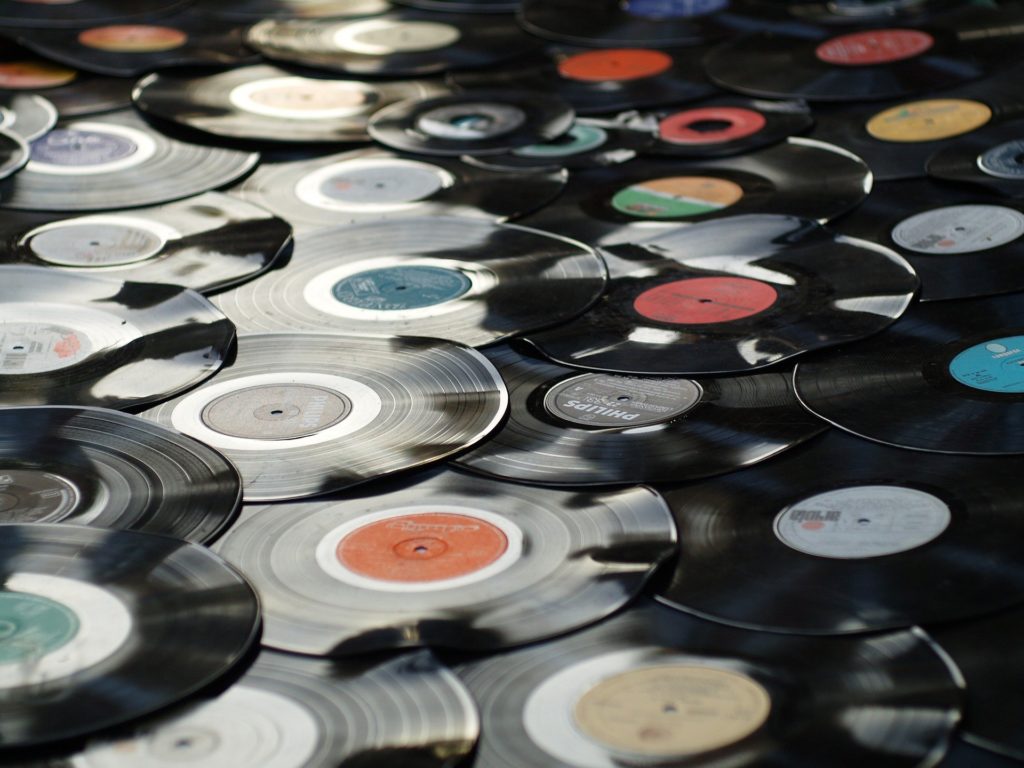Is old new music REALLY crowding out new music? [Fred Jacobs]
“Old music now represents 70% of the US music market. Even worse: the new music market is actually shrinking,” That stat and statement caused a firestorm. But Is old music really killing new music, or are we just in a pandemic induced lull?
A guest post by Fred Jacobs of Jacobs Media.
I always know something’s going on when more than a few people send me a news story “that make a great blog post.” That was the case last week when Steve Goldstein, Jim Cutler, Brother Bill, and a couple others sent me a devastating essay in The Atlantic by Ted Gioia, author and observer of all things music. The title of his opinion piece ought to be enough to send shivers down your back, whether you’re in the music, radio, or streaming business:
“Is Old Music Killing New Music?”
The headline had a ring of familiarity. A quick search of JacoBLOG revealed I wrote a blog with a similar title and an eerily similar ring last January. In fact, I reran it as a “Best of” late last month. My pithy title was “Can New Music Compete Against Classic Rock?” and it explored many of the same themes Gioia lists in his lawyer-like takedown of the new music environment, especially the record labels.
He and I both agree the swing toward “old music” (can we just call it “classic?”) hit hyper-speed during COVID as legions of freaked out people retreated to the familiar, cushy confines of nostalgia. But this trend was in play long before we started wearing masks and arguing about the vaccine. Back in 2019 in the UK, three of the country’s top 10 best-selling albums were greatest hits compilations by Queen, Elton John, and Fleetwood Mac – not exactly the latest and greatest music.
It is fascinating to watch our current phase, given my experience with Classic Rock in the early 80’s where the question always was, “But will it last?” Now, respected music critics and pop culture observers are asking the same question about new music and new artists.
In his analysis, Gioia goes right to the data to support his contention that even among “streamies,” the musical diet is laced with gold. The subhead of his opinion piece is like a “spoiler alert” – a tipoff about what’s to come:
“Old songs now represent 70% of the U.S. music market.
Even worse: The new-music market is actually shrinking.”
And Gioia uses data to back up his claims, citing MRC research from the past couple years:

And these numbers aren’t just based on Baby Boomers listening to their old King Crimson and Steely Dan records. A devastating stat in The Atlantic piece underscores the fact that even streaming has turned old.
Very old.
Gioia notes “the 200 most popular new tracks now regularly account for less than 5 percent of total streams.” Three years ago, that number was twice as high. In aggregate, there’s more streaming going of Grand Funk-era songs than Arianna Grande music.
For breakout new songs, it’s a puny performance, and it’s headed in the wrong direction. To prove his point the issue goes beyond the music and permeates the culture, Gioia cites the crash of Grammy Award ratings as proof positive most consumers just don’t give a rat’s patootiee about new music. Now in general, awards shows have almost all been down-trending, hitting new lows during these past two COVID seasons. Still, these numbers were sinking pre-pandemic, hitting an all-time low last year.

Gioia makes the assertion that never before in history has new music had such a miniscule impact on our cultural fabric.
In the meantime, Classic Rock is bringing home the bacon…and the eggs, the hash browns, and the entire menu. The gold rush to buy artist catalogs is full steam ahead, including Mt. Rushmore icons such as Springsteen, Dylan, Bowie, and Steve Nicks. Expect more of these “sales” in the coming months and years as classic artists cash in on their catalogues.

It is also noteworthy the best-selling physical music format today is ironically vinyl. Now keep in mind that most people aren’t actually purchasing music anymore – CDs, cassettes, mp3s, or records. But of those who just have to own it , vinyl is back in style, underscoring the trend that what’s old is cool.
And Goia concludes by claiming the future for new music is not a bright one. that’s because record execs have lost faith in discovering new artists, styles, and genres. He points to label investment gathering momentum in the catalogue silo, while it continues to head backwards in the new music category.
I get nervous when analysts in any field – movies, finance, health and fitness, and yes, music – start making sweeping conclusions based mostly on the last two years. The debate over the workplace falls into this zone. We simply are not going to know where we’ll be doing our jobs a year or two from now. We can’t predict how our lives will evolve on the other side of the pandemic.
Assumptions about where music is or isn’t going are difficult and dangerous when based on 2020-21 trends for all these reasons. COVID has broken our compasses, making forecasting precarious at best.
The pandemic is an anomaly. But much of the data surrounding new music’s trajectory were already trending down before we were arguing about masks. I liken it to online shopping – in reverse. During the last five years, more and more of us were doing our shopping online, thanks in no small part to the explosion of Amazon Prime. COVID accelerated that trend, forcing brick-and-mortar stores like Macy’s, Walmart, Nordstrom, and even local retailers to establish and or bulk up their e-commerce efforts.
Interestingly, Gioia finishes his piece with a ray of hope. That’s because he’s certain – and I share this belief – that “the next big thing won’t sound like the last big thing.” That’s my quote, and I believe it stands the test of music discovery time. When we expect the next wave of music to sound like the current fare, it’s easy to miss what’s next.
Elvis didn’t sound like Sinatra. The Beatles didn’t sound like Elvis. The Sugarhill Gang didn’t sound like the Beatles. And Nirvana didn’t sound like the Sugarhill Gang.
Simplistic? Perhaps, but most corporate music mavens never saw these changes coming. We laugh now at the record executives who missed the next hot trend or failed to sign a great band. But that’s the whole point of not knowing where we’re going…until we already get there.
Gioia’s conclusion about how this story might end:
“…not with the marginalization of new music, but with something radical emerging from an unexpected place.”
When does this happen? In this environment, how can it happen? Will it even happen? Good questions all. None of us knows how this saga will play out. Is the end or is it just the beginning?

Still, you have to wonder whether the conditions that enabled new music discovery – and let’s give radio its due credit here – have changed, perhaps permanently making it difficult to expose new music on a mass basis.
That’s one way of looking at it. But I have a sense of confidence the new music conundrum will, in fact, sort itself out. There will be great new bands, artists, songs, and genres that will surprise, delight, and remind us we’re on a cultural roller coaster that while far from flat, has its shares of thrills…and maybe even spills.
And you’re hearing this from the Classic Rock guy.
You can read Ted Gioia’s piece in The Atlantic here.
Fred Jacobs founded Jacobs Media in 1983, and quickly became known for the creation of the Classic Rock radio format. Jacobs Media has consistently walked the walk in the digital space, providing insights and guidance through its well-read national Techsurveys. In 2008, jacapps was launched – a mobile apps company that has designed and built more than 1,300 apps for both the Apple and Android platforms. In 2013, the DASH Conference was created – a mashup of radio and automotive, designed to foster better understanding of the “connected car” and its impact. Along with providing the creative and intellectual direction for the company, Fred consults many of Jacobs Media’s commercial and public radio clients, in addition to media brands looking to thrive in the rapidly changing tech environment. Fred was inducted into the Radio Hall of Fame in 2018.
No I think OLD Music has it’s own purification. If i want to Choose i will go through to the OLD Music.
OLD MUSIC is Pure LOVE. I go for OLD one
Music Is LOVE
From a DIY project to a major renovation makeover, remodeling anything in your house is easy with professional tips and tricks.
A suitable big exercise mat should provide grip, balance, and comfort. However, certain characteristics may be more important depending on how a person intends to use the mat.
Welcome to Ottawa Spray Foam Insulation where we have been providing our Ottawa neighbors with high-quality insulation for many years now.
Trust Universal Pest & Termite for pest control protection, termite treatment services and peace of mind.
Old is gold